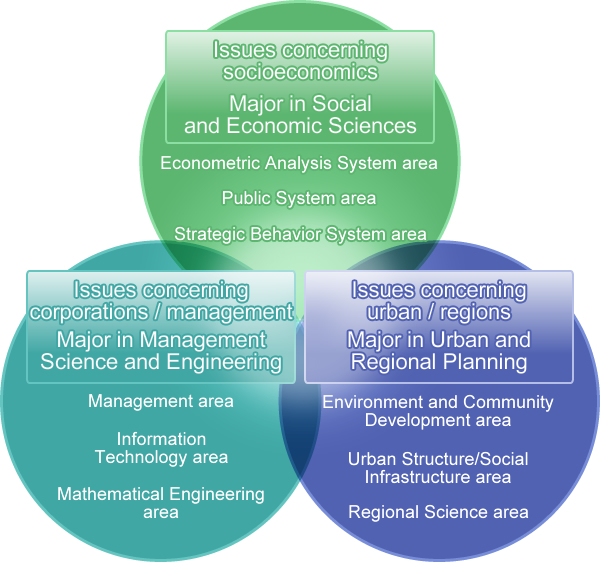3 majors and 9 areas

Three Majors
- ・The CPPS at Tsukuba offers three majors: the Major in Social and Economic Sciences, the Major in Management Science and Engineering, and the Major in Urban and Regional Planning. They align with the three important problem domains: Socioeconomics, Corporations/Management, and Cities/Regions.
- ・One of the major unique features of the CPPS at Tsukuba is that students have ample time, between the first year and the Spring semester of the second year, to carefully explore the type of problem they want to engage with, and in which major.
- ・Matriculation into a major takes place at the end of the Spring semester of the second year. However, the CPPS at Tsukuba offers course groups based on goal orientations in nine topical areas, so you can determine the curricula during and after the second year, based on your individual interests in issues, and accumulate knowledge that is uniquely yours.
Nine Areas
- ・The CPPS at Tsukuba offers three areas for each major.
- ・The basic design is such that each area consists of multiple lecture courses and one practice course.
- ・You can fulfill the minimum completion requirements for your chosen major by earning a certain number of credits from the lecture and practice courses included in the three areas of the major you selected.
- ・The CPPS at Tsukuba focuses on interdisciplinarity. To graduate, you are also required to earn a certain number of credits in the six areas of the majors you did not choose.
Major in Social and Economic Sciences
The Major in Social and Economic Sciences views the institutions that connect individuals, society, and an economy as "systems." You will study the theories for designing systems, data analysis methods for testing systems, and specific policy formulations for solving socio-economic problems.
Econometric Analysis System area
You will search for a solution by quantitative approaches to socio-economic issues. You will mainly use the econometric data analysis for financial and economic problems.
Public System area
You will consider the nature of socio-economic systems in the contemporary economy. You will explore the policy role of the public sector in remedying market failure and the unequal distribution of income.
Strategic Behavior System area
You will learn about the most critical elements of a socio-economic system: human decision-making and strategic behavior. Your understanding will help you to form the basis of policy assessment/formulation to solve socio-economic problems.
Major in Management Science and Engineering
Today, organizations including corporations are increasingly using cutting-edge information technology (IT) and mathematical engineering to manage, operate, and make decisions based on objective facts. The aim of the Major in Management Science and Engineering is to develop individuals so they possess world-class capabilities that combine mathematics, IT, and field performance.
Management area
The Major focuses on the development of individuals who can grasp and solve a variety of the real-world problems that managements face. Students will also develop skills through Management Practice to apply specialized knowledge to management issues on the ground, and to make the right decision at the right time.
Information Technology area
We offer courses ranging from fundamental technologies supporting web services and operation information systems to theoretical foundations of the calculation tools used in data analysis and simulations to examples of application in engineering management.
Mathematical Engineering area
You will learn to use various mathematical models that function as powerful tools when practicing "scientific management," which is the goal of engineering management.
Major in Urban and Regional Planning
The cities we live in are facing diverse problems. The Major in Urban and Regional Planning develops individuals to analyze problems using scientific and engineering methods and propose solutions to help all kinds of people to live safely, conveniently, and comfortably in cities.
Environment and Community Development area
You will study practical theories and cases related to the construction and preservation of actual urban space, and acquire conceptualization and design techniques and presentation skills necessary to formulate specific plans. You will also become qualified to take the examinations for 1st-class and 2nd-class Architect (Kenchikushi in Japanese) certification.
Urban Structure/Social Infrastructure area
You will study urban structure, and the planning of land use, traffic, disaster prevention, etc., that supports it, and social infrastructure (such as urban facilities) that support people's activities. Using tools such as simulation and a Geographical Information System, you will learn about urban planning techniques.
Regional Science area
You will also learn economic theories on cities, regions, and environments, and theories that enable scientific understanding of urban and regional phenomena, and analytical and evaluation techniques needed for policy formulation and planning.

